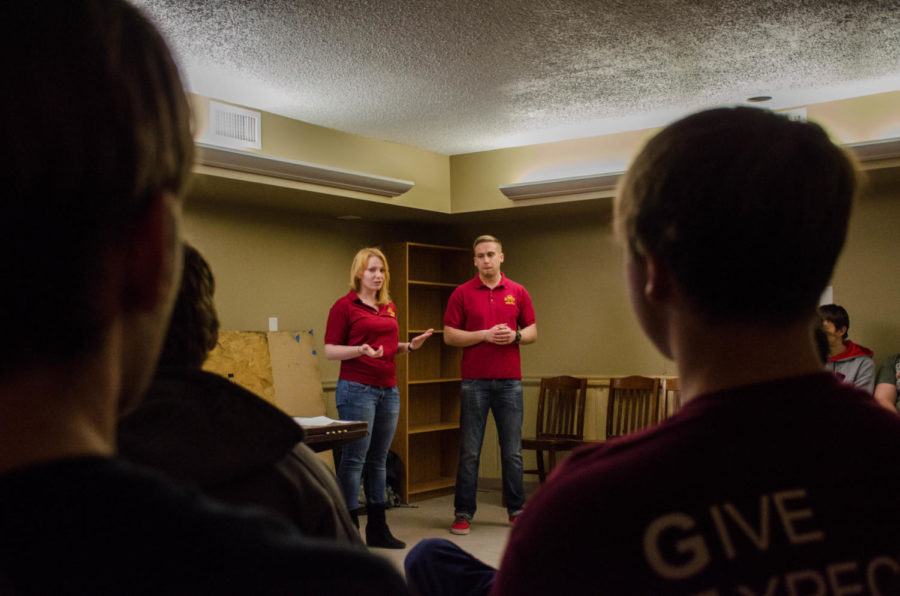Cadets present sexual assault prevention tips
February 17, 2015
She was dizzy and light headed. She slurred her words. Her friends had left the bar. She accepted a ride home from a guy she doesn’t know well.
This was the beginning of one scenario that two Army ROTC cadets posed to members of Phi Kappa Theta fraternity at a sexual assault and harassment prevention training session they led Monday.
In the basement of the fraternity house, Jessica Bales, senior in public relations, and Evan Ireland, senior in supply chain management, stood in front of 19 men. The two are leaders in Cadets Against Sexual Harassment/Assault, a cadet-led education, response and prevention program.
They defined sexual misconduct, assault, abuse and harassment. Then they defined consent.
“Who in here has a sister?” Ireland said.
About half of the audience raised their hands.
Ireland hopes they would stand up to protect each other’s loved ones from a dangerous situation like this, he said.
The presentation came after a suggestion from the fraternity’s alumni at a recent meeting. Jordan Donner, senior in in chemical engineering and executive vice president, risk management chairman of Phi Kappa Theta, ran with the idea.
He contacted Bales, a friend of his from high school, whom he knew worked with sexual assault and harassment prevention.
“Hopefully it starts with an impact here,” Donner said. “And guys can transmit that to other guys they meet and it becomes not just one section of the community’s problem, but something everyone is aware of.”
A total of six sexual assaults have been reported to the Iowa State Police Division this academic year, according to the daily crime log.
It made Bales uncomfortable knowing she went to a school where this happens, she said. She knew people who were sexually assaulted and saw harassment happen in her Army basic training.
“After being with your friends going through that, it made it real,” Bales said.
People need to know what sexual harassment is and how to stop someone else or themselves, Donner said.
Hearing the information from ROTC cadets helped the members take the message seriously because they are students with slightly more authority, Donner said.
“Going through ROTC kind of gives you more respect,” he said. “It’s a good position to learn from.”
Cadets at West Point Military Academy started CASH/A. Iowa State Army ROTC leaders learned about the program and introduced it here last semester.
The program designates a male and a female cadet from each grade as a trusted contact for ROTC members to ask questions, report concerns or incidents and receive advice and resources from. These eight representatives and other interested cadets participated in a sexual assault harassment prevention conference in Kansas City last semester.
That training is shared with other cadets in military science classes. Cadets Against Sexual Harassment/Assault aims to spread training to include working with the university and campus agencies.
“We talk and we teach respect for one another,” said Master Sgt. Christopher Shaiko, adjunct instructor of military science and tactics. “Sexual assault and harassment don’t fall along those lines of respecting each other.”
Sexual harassment and violence “violate everything the U.S. Army stands for,” according to the Army’s Sexual Harassment/Assault Response and Prevention program, SHARP.
Aaron Hett, senior in mechanical engineering, is the cadet in charge of the program. He said it combats a cultural problem, which people should work together to solve.
“There isn’t a reason why people can’t be all incorporated to finding the same set of ideas to try to uphold,” he said.
More should be done to confront this problem and give every cadet and midshipman a safe place to learn, free from sexual harassment and assault, said Maj. Gen. Jeffrey Snow, director of the Department of Defense Sexual Assault Prevention and Response office, in a Feb. 11 Department of Defense press release.
Bales and Ireland said that bystanders could stop a rape from happening.
The cadets stressed five bystander intervention tips to stop sexual assault and harassment. They were to notice the event, recognize when to intervene, see personal responsibility, know how to act and take action.
Ireland said that if someone saw a man steal an old lady’s purse, they wouldn’t just stand by, they would intervene.
“You can be that guy,” he said. “You can go home feeling good about yourself.”

















